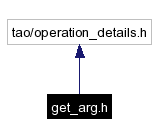
#include "tao/operation_details.h"Include dependency graph for get_arg.h:

This graph shows which files directly or indirectly include this file:

Namespaces | |
| namespace | TAO |
| namespace | TAO::Portable_Server |
Functions | |
| template<typename T, typename RET_ARG_TYPE> | |
| RET_ARG_TYPE | get_ret_arg (TAO_Operation_Details const *details, TAO::Argument *const *skel_args) |
| Get return value/argument. | |
| template<typename T, typename IN_ARG_TYPE> | |
| IN_ARG_TYPE | get_in_arg (TAO_Operation_Details const *details, TAO::Argument *const *skel_args, size_t i) |
| Get "in" argument. | |
| template<typename T, typename INOUT_ARG_TYPE> | |
| INOUT_ARG_TYPE | get_inout_arg (TAO_Operation_Details const *details, TAO::Argument *const *skel_args, size_t i) |
| Get "inout" argument. | |
| template<typename T, typename OUT_ARG_TYPE> | |
| OUT_ARG_TYPE | get_out_arg (TAO_Operation_Details const *details, TAO::Argument *const *skel_args, size_t i) |
| Get "out" argument. | |
Thru-POA/skeleton argument selection function templates.
|
||||||||||||||||||||
|
Get "in" argument.
|
|
||||||||||||||||||||
|
Get "inout" argument.
|
|
||||||||||||||||||||
|
Get "out" argument.
|
|
||||||||||||||||
|
Get return value/argument.
|
 1.3.9.1
1.3.9.1